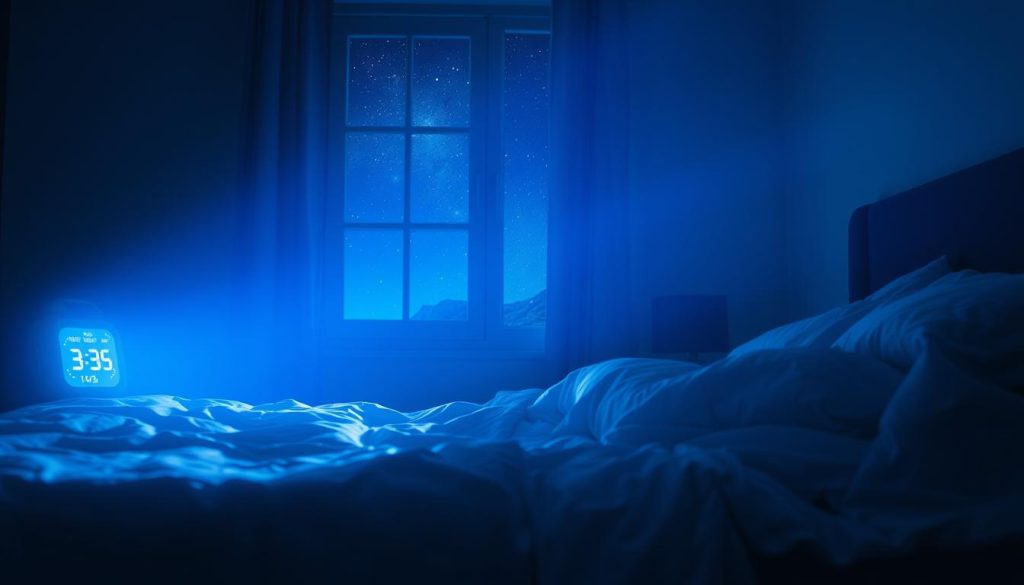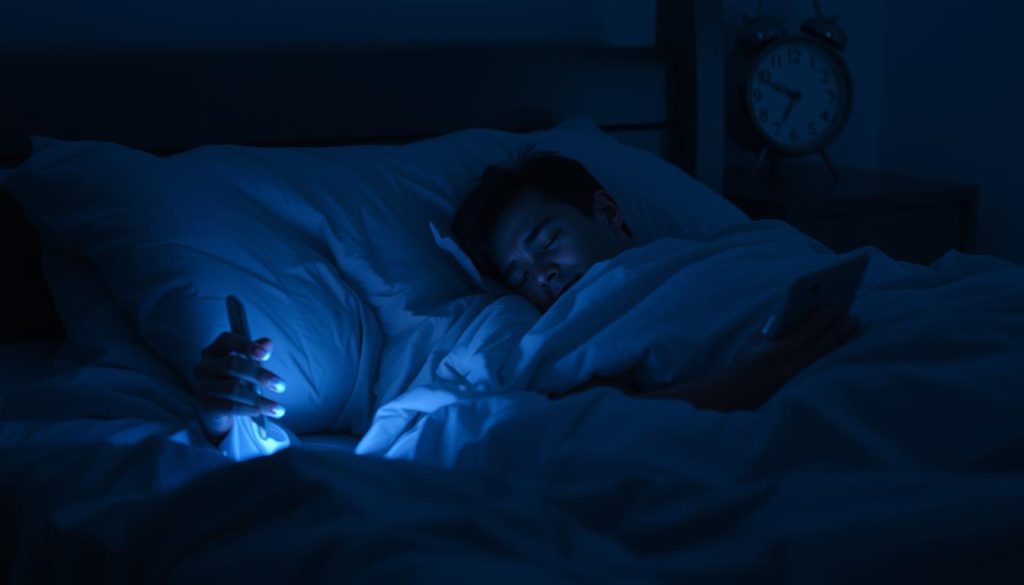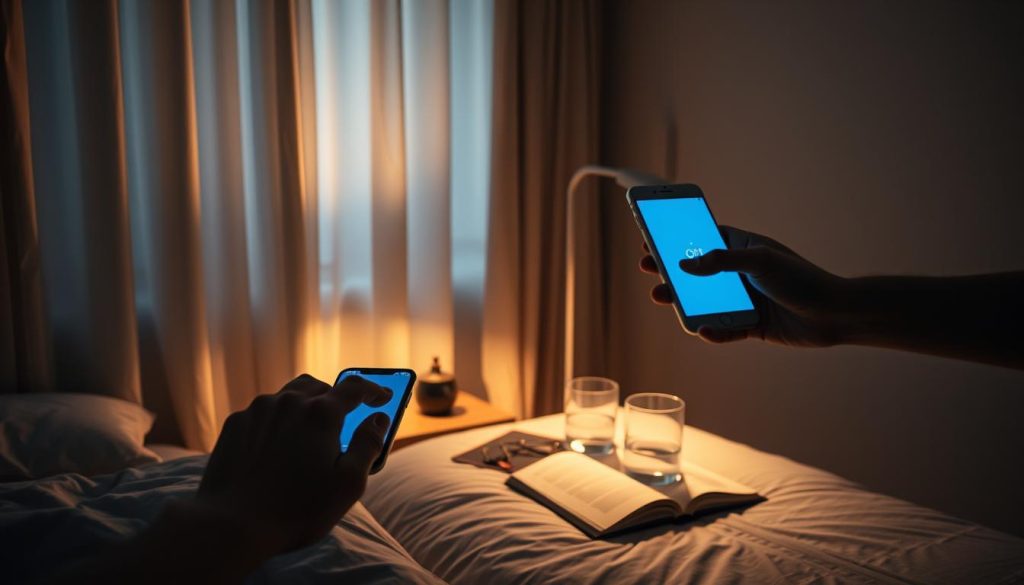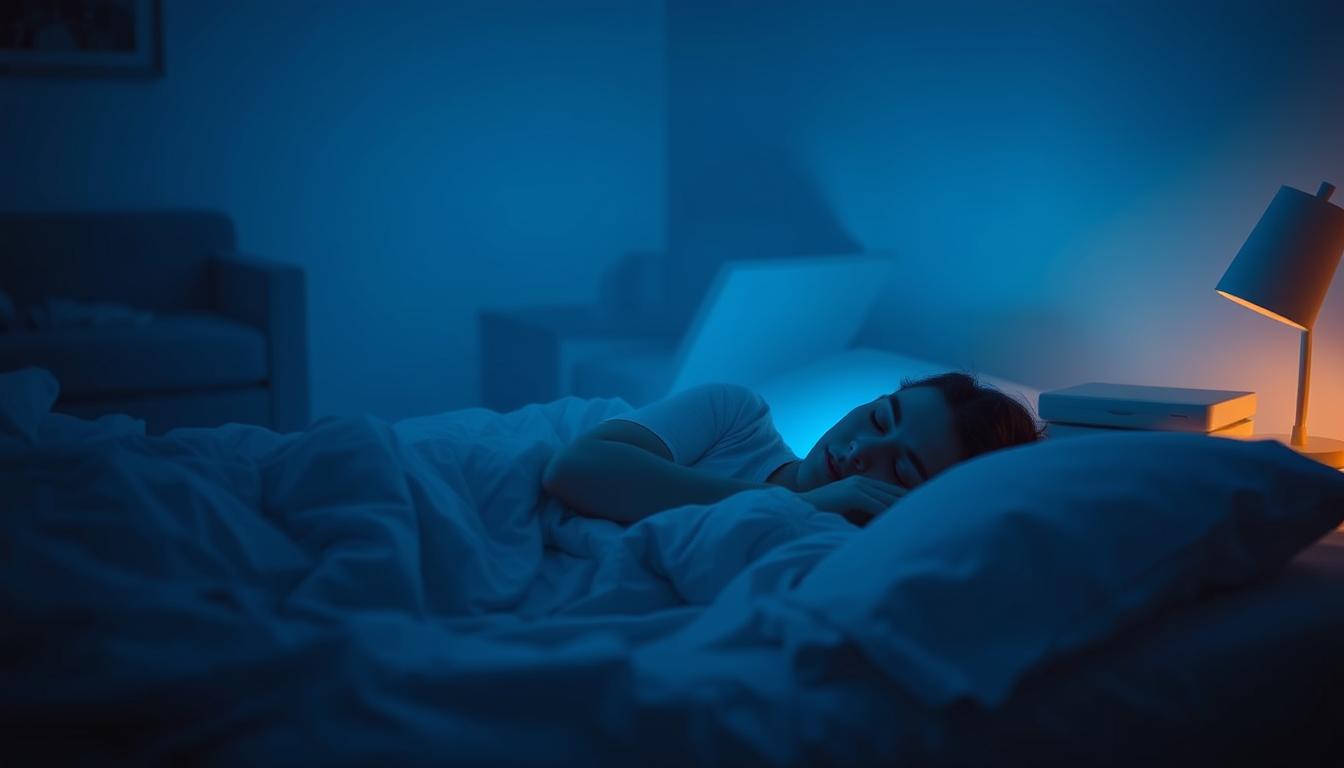In today’s world, knowing how blue light affects sleep is key. With more time spent on screens, many don’t realize blue light can mess with their sleep. This is a big worry as sleep quality problems grow.
We’ll look into how blue light affects your sleep. We’ll also find ways to protect your sleep from its impact.
Understanding Blue Light: What Is It?
Blue light is a type of visible light in the electromagnetic spectrum. It has wavelengths between 380 and 500 nanometers. This makes it scatter more easily, giving the sky its color.
Knowing about the blue light spectrum is important. It’s everywhere and affects our lives a lot. Natural blue light helps us stay alert and keeps our circadian rhythm in check. But too much artificial blue light, especially at night, can hurt our sleep.
Studies show that blue light before bed can mess with melatonin production. This can make it hard to fall asleep and lower sleep quality. It’s important to know when blue light is good and when it’s bad for us.
The Natural and Artificial Sources of Blue Light
Blue light is everywhere in our lives, coming from both nature and man-made things. Knowing where this light comes from helps us control how much we get. Let’s look at these sources and how they affect our health.
Sunlight
Sunlight is the main natural source of blue light. It helps keep our body clocks in sync. It makes us feel awake and happy during the day. But, too much sunlight at night can mess with our sleep.
Electronic Devices
Today, we use lots of electronic devices, which give off blue light. Phones, tablets, computers, and TVs all do this. It’s key to watch how much time we spend on these before bed to protect our sleep.
LED Lighting
LED lights are common in homes and offices. They’re energy-saving and last a long time. But, they give off more blue light than old bulbs. This can make our brains think it’s still day, making it hard to fall asleep.
How Blue Light Affects Your Circadian Rhythm
It’s important to understand how blue light affects our sleep-wake cycles. Blue light has a big impact on our body’s internal clock. This clock controls many important functions in our body.

The Role of Light in Sleep-Wake Cycles
Light, especially blue light, is key to our sleep-wake cycle. Natural light during the day keeps our body in sync with the environment. When light hits our eyes, it tells our brain to stay awake.
Disruption of Circadian Rhythm by Blue Light Exposure
Too much blue light, especially from screens, can mess up our sleep-wake cycle. This happens because blue light stops melatonin production. Melatonin is the hormone that helps us sleep. So, this can make our sleep poor and upset our body’s rhythm.
The Harmful Effects of Blue Light Exposure on Sleep
In recent years, we’ve learned more about blue light’s impact on sleep. With our lives more tied to screens, knowing how blue light affects sleep is key. This part explores how blue light can harm sleep quality, make it hard to fall asleep, and shorten sleep time.
Reduced Sleep Quality
Blue light can make sleep worse. Exposure to it, especially from screens before bed, leads to restless sleep. This can cause daytime tiredness and lower brain function, affecting our health.
Difficulty Falling Asleep
Blue light messes with melatonin, the sleep hormone. Using devices before bed tricks your brain into thinking it’s still day. This makes it tough to fall asleep fast.
Shortened Sleep Duration
Lastly, blue light can shorten sleep time. Poor sleep quality and trouble falling asleep mean less sleep overall. People exposed to blue light before bed might wake up early but still feel tired, as their sleep is disrupted.
The Science Behind Blue Light and Melatonin Production
Research shows how blue light affects melatonin, our sleep hormone. Blue light, especially in the evening, reduces melatonin production. This is called melatonin suppression and affects our sleep-wake cycles.
Melatonin helps us sleep and wake up on time. But blue light from screens, LED lights, and some fluorescent lights can mess with this. Studies link blue light to less melatonin, showing its impact on sleep.
Studies explain how blue light affects melatonin levels. Our retina’s photoreceptors, especially ipRGCs, are very sensitive to blue light. When they detect blue light, they tell the SCN, our brain’s clock, to stop melatonin release. This shows why we should limit blue light before bed to keep melatonin levels healthy.
Blue Light Exposure and Sleep Disorders
Blue light exposure is linked to sleep disorders. This is a big worry in our digital world. We need to understand how it affects our sleep.

Insomnia
Insomnia is a common sleep problem. It gets worse with blue light. Blue light stops melatonin, which helps us sleep.
This can make it hard to fall and stay asleep. It leads to chronic insomnia and problems with blue light.
Delayed Sleep Phase Syndrome
Delayed Sleep Phase Syndrome (DSPS) is also affected by blue light. People with DSPS sleep late. Blue light makes it harder to sleep early.
It delays melatonin release. This makes it tough to follow a regular sleep schedule.
To understand blue light’s impact, here’s a comparison table:
| Type of Disorder | Impact of Blue Light | Symptoms Exacerbated |
|---|---|---|
| Insomnia | Suppresses melatonin, delays sleep onset | Difficulty falling asleep, frequent awakenings |
| Delayed Sleep Phase Syndrome | Delays circadian rhythms, hinders melatonin release | Difficulties waking up, extreme late sleep times |
Blue Light Blocking Glasses: Do They Help?
Blue light blocking glasses have become very popular. People are looking for ways to improve their sleep. These glasses aim to block blue light from screens, which can mess with sleep.
There are many types of blue light blocking glasses available. You can find them from affordable brands to more expensive ones. They are seen as a way to reduce eye strain and help sleep better.
Studies suggest that these glasses might help with sleep. They can block blue light, which could lead to better sleep and a stronger body clock. But, it’s key to pick the right ones, as not all are created equal.
When picking blue light blocking glasses, think about the lens quality, how comfortable they are, and how well they block blue light. It’s a good idea to do your research. Also, using them with blue light filters on devices can help even more.
In short, blue light blocking glasses could be a good sleep aid. But, how well they work depends on the product and how you use them. As more people look for ways to sleep better, these glasses are a practical choice.
Blue Light Filters for Sleep Improvement
Electronic screens are everywhere in our lives today. This makes digital device sleep solutions key. Blue light filters are a top choice for better sleep. They cut down on blue light from screens, helping our sleep patterns.
Smartphones, tablets, and computers often have blue light filters. They can be turned on in the evening. This helps our bodies make melatonin, the hormone that helps us sleep.
Special screen protectors with blue light filters are also out there. They offer protection on all devices. Adding these to your daily routine can really help your sleep.
Daily Habits to Reduce Blue Light Exposure
Creating daily habits can greatly cut down on blue light exposure, especially at night. These habits not only improve your sleep but also boost your overall health.
Limiting Screen Time Before Bed
Reducing screen time at night is a smart move. Devices like phones, tablets, and computers give off blue light that can mess with your sleep. Try to avoid screens for at least an hour before bedtime to see a big difference.
Using Night Mode Features
Today’s gadgets often have night mode or blue light filters. Turning on night mode changes the screen’s color to warmer tones, cutting down blue light. Apple devices have Night Shift, and Android has similar options to help you sleep better.

Implementing Blue Light Filters
Blue light filter apps or screen protectors can also help a lot. They block or absorb blue light, protecting your eyes and helping you relax before bed. Apps like f.lux or your device’s built-in features can manage blue light levels well.
Creating a Sleep-Friendly Environment
Creating a sleep-friendly environment is key to better sleep. Start by using room-darkening shades to block out light. This makes your bedroom dark, signaling to your brain it’s time to sleep.
Use low-intensity, warm lighting in your bedroom. Stay away from blue light LEDs, as they can mess with your sleep. Choose lamps with dimmable settings to adjust the light as needed.
Decor is also important for a sleep-friendly room. Choose calming colors like soft blues, grays, or pastels. Keep your room tidy and peaceful, making it a restful place.
Keeping your room at a comfortable temperature is also crucial. Aim for a cool room, between 60-67 degrees Fahrenheit. This temperature is best for sleep and can improve its quality.
Finally, add calming scents like lavender or chamomile through diffusers or candles. These scents can help you relax before bed. Making these changes can greatly improve your sleep by creating a soothing environment.
Children and Blue Light: Extra Precautions to Take
Keeping children safe means being careful about blue light. Their brains are still growing, making them more vulnerable to blue light’s effects. This can mess with their sleep and learning. Parents can help by teaching healthy screen time habits and making sure kids get enough sleep.
Impact on Developing Brains
Studies show that blue light can harm a child’s brain. The younger they are, the more damage it can cause. This can affect their learning, behavior, and sleep. It’s important to limit screen time, especially before bed, to keep kids healthy.
Encouraging Healthy Screen Habits
It’s key to teach kids good screen habits. To reduce blue light’s harm, parents can follow these steps:
- Set daily limits on screen time.
- Make sure kids take breaks from screens.
- Use blue light filters and night mode on devices.
- Encourage activities that don’t involve screens, like reading or playing outside.
By following these tips, parents can help their kids sleep better and live a balanced life. These precautions are important in today’s digital world.
The Positive Role of Natural Blue Light During the Day
Blue light isn’t always bad. In fact, natural blue light during the day is great for us. It makes us feel more awake and alert, boosting our mood and productivity.
Boosting Mood and Alertness
Getting natural blue light is good for our mood and alertness. Sunlight wakes up parts of our brain that control how we feel and our energy. This makes us clearer-headed and more focused.
Studies show that natural light can also fight depression and make us happier.
Supporting Natural Sleep Patterns
But blue light isn’t just good for being awake. It also helps us sleep better. Being outside during the day keeps our body’s clock in sync. This means we sleep better at night.
So, spending time outside in the day helps us sleep better and wake up feeling refreshed.
Expert Opinions on Blue Light and Sleep
We talked to top sleep experts, researchers, and doctors to understand blue light’s impact on sleep. Dr. Charles Czeisler from Harvard Medical School says blue light is key to our body clock. He notes that natural blue light in the day boosts mood and alertness. But, too much artificial blue light at night messes with melatonin, causing bad sleep.
Dr. Anne-Marie Chang also shares her views. She points out that electronic devices are a big source of artificial blue light. She suggests using blue light filters or taking breaks from devices before bed to improve sleep.
The American Academy of Sleep Medicine (AASM) also warns about blue light. They say it’s bad to use devices with blue light at night. They suggest dimming lights and using night mode on devices to cut down on blue light. These experts all agree: managing light is key to good sleep.

